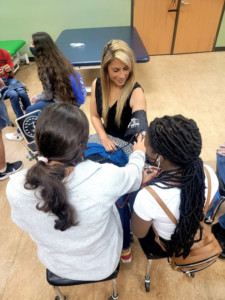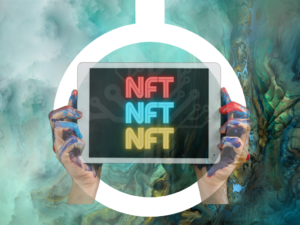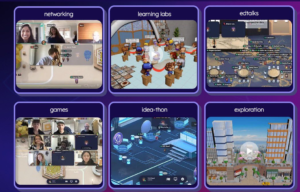The Future of Education is Emergent

Kristin Garn
“Emergence is a paradox: emergent properties are often changeless and changing, constant and fluctuating, persistent and shifting, inevitable and unpredictable, dependent and independent from the system in which they arise.” –J. Fromm
Twenty-five years ago, while studying pure mathematics, I had my first encounter with complexity theory. My advisor had a math and physics background and he introduced me to this fascinating area of systems theory which was in its infancy.
It was the late eighties and stock markets had just erupted with early computerized trading (Black Monday). My peers were busy exchanging mixtapes, painstakingly created using dual cassette decks and requiring a leisurely patience that I fear might face extinction.
Fast forward to today and I am now running an educational technology company. Every day my team navigates the turbulent flow of digital student behavior. My company plays around in the emerging field of mobile student data and we find it thrilling to explore social applications for the systems theories I studied years ago.
The relevance of complexity and emergence to education is a big part of the next digital revolution. It is essential, though, to remember that today’s technology innovates much faster than our traditional educational systems.
Education favors proven process (research), while data-driven technology demands rapid iteration. Given this dichotomy, I ponder how my company can thoughtfully anticipate change while still achieving purposeful and progressive solutions for our education systems.
What might the data-driven educational models of the future look like and how might they serve us better? Are there looming threats or opportunities for which we can prepare?
Today, the creation, collection and distribution of music, marketing, media and money are all being achieved using digital data. It is foolhardy to believe that education won’t soon be, as well.
I’m deeply interested in the potential that will be realized when more students are able to use their personal mobile devices for learning and data collection. I also know that accurate and relevant use of student data remains elusive. Big caveat: here, my consideration of complexity and its potential benefits and impacts on education naively assumes that student privacy will be upheld.
In systems theory, emergence is a process of finding patterns and regularities that can arise through interactions among simpler, smaller parts of a system which themselves might not exhibit individual complex properties. Complexity results from the connections among, between and within their individual parts.
Digital data implies complexity and, in “self-organizing” processes (like our own cognitive construction of meaning), this produces emergence. Emergence helps to explain unpredictable and even destructive phenomena like tornadoes and flash floods, as well as wonderfully complex organisms like the human brain, not to mention Twitter and the world wide web.
This essay itself is a closed complex system with emergent potential. The meaning that it produces for the reader can be understood through emergence theory. I’ve been given a thousand word limit (my boundary) to explain why I think complexity and emergence are important concepts for education today.
Each word in this post is a singular, simple piece of information within the whole essay. In a similar way, each student (or teacher/administrator) performs constant, measurable actions within the larger education system that can be interpreted through data analytical models to produce recommendations and insights.
These sentences and paragraphs that I’m constructing hold more meaning together than each of the separate words in any other combination. Since these words are recorded and can be tracked digitally, one could construct a system to anticipate their implied meaning. However, few (if any) of those systems would accurately predict all possible emergent human interpretations.
When a reader encounters this organized word-post, he or she constructs meaning from the whole system (an emergent phenomenon). Readers also have access to a growing network of opportunities (think: Twitter, social media, comments, word of mouth) to share, add to, and even alter this meaning. As the complexity of the system increases, it renders the emergent interpretation of this meaning much more difficult to predict.
In the context of this essay, a reader can derive meaning from the complex interplay of my words along with their own personal ideas, memories and assumptions, not to mention their increasing opportunities to link to other digital material and to facilitate new discussions. The main thing about emergent behavior is that it is incredibly difficult to predict (consider the challenges for long term educational policy and planning).
Even though I am the originator of these words, I have little control over their eventual interpretation and can only hope to imply a meaningful pattern that will emerge coherently, though beyond my control.
Control is an important concept for complexity and emergence. Some of our more unfortunate shared history within education can arguably be linked to the desire to control participants by filtering them through restrictive and non-flexible processes. However, human reaction is complex and will always have limited predictability.
Emergence particularly occurs in complex systems with no central control, no management, no director (think: the internet). Reframing education from a complexity perspective can help us to explore how the relatively simple parts of our organizations can interact to facilitate new behaviours within the whole, especially when there is no central control, no management, no director, and an increasing amount of digital connections. Student use of personal mobile devices is a particular example of this.
In the very near future, educational data will undoubtedly be combined in the hopes of producing meaningful patterns. The components of this new system will inevitably increase (exponentially) with the amount of available data. This will potentially allow for new and unforeseen types of educational models to emerge. Full disclosure: I’m excited that blended learning is an emerging field that will result from this.
One of the many reasons that the greater education system can already be interpreted as a complex structure with emergent properties is that it is, by nature, transdisciplinary and participatory. In other words – there are almost an infinitely and constantly changing number of ideas and people involved in the construction of either the whole, or a subset of, the education system.
Thinking in this complexity framework is still relatively new for systems theorists, but it is now especially crucial as the tools of the system (think: educational software) become increasingly adaptive and, eventually, intelligent.
My sincere hope is that the emergent opportunities in education will favor the common human needs that are at the core of the system’s existence. Advocates for 21st century learning practices are doing a good job of highlighting new opportunities that might increase flexibility and personalization for all participants in our systems.
I remain realistically aware that there is a great disconnect between the complexity of available educational data and the slow-moving frameworks of our existing systems. My hope is that, with an early awareness of the complex potentials for new digital education paradigms, we can support our systems architects as they explore all the creative potentials. At their best, our future education systems might learn from these new models and become as adaptive and as responsive as the complex individuals for whom these adaptive digital tools are being constructed.
For more, check out:

Kristin Garn is the CEO of Mathtoons Media. Follow Kristin on Twitter, @mypracti.







0 Comments
Leave a Comment
Your email address will not be published. All fields are required.